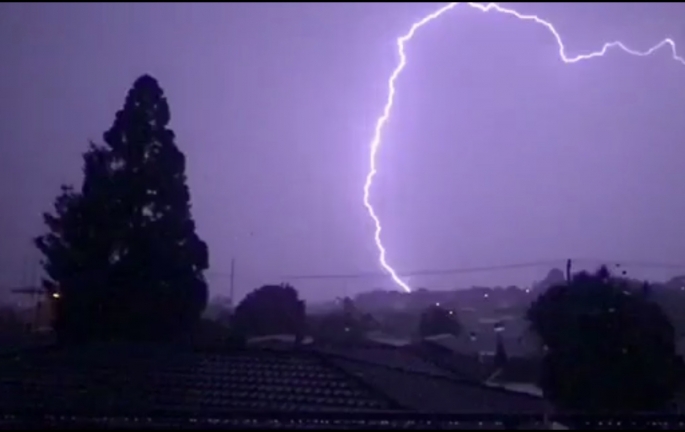1.08pm update:
A severe thunderstorm watch remains in place for much of the upper North Island on Sunday afternoon.
The MetService has reported that a strong unstable northwest flow is covering the upper North Island today, bringing squally thunderstorms to many areas.
There is a chance that some of these thunderstorms may become severe, bringing damaging wind gusts of 110 km per hour or stronger - mainly near the coast - from Northland to Waikato, Coromandel Peninsula, Bay of Plenty and the ranges of Gisborne through until tonight, but especially this evening.
Wind gusts of this strength can cause some structural damage, including trees and power lines, and may make driving hazardous.
The Metservice advises that people living in the areas mentioned should stay on the lookout for threatening weather conditions and continue to monitor the severe thunderstorm warnings.
Earlier, 9.30am Sunday August 11:
A severe thunderstorm watch has been issued by the MetService this morning for much of the upper North Island, including the Bay of Plenty.
This watch affects people in the Northland, Auckland, Great Barrier Island, Coromandel Peninsula, Waikato, Bay of Plenty, Rotorua and Gisborne districts.
An active front should move over the upper North Island this afternoon and evening, clearing East Cape tonight.
This front is expected to bring thunderstorms to many areas. There is a chance that some of these thunderstorms may become severe bringing damaging wind gusts of 110 km per hour or stronger, mainly near the coast, from Northland to Waikato and Coromandel Peninsula this afternoon and early evening, and Bay of Plenty and the ranges of Gisborne late afternoon through to tonight.
Wind gusts of this strength can cause some structural damage, including trees and power lines, and may make driving hazardous.
A severe thunderstorm watch means conditions are favourable for severe thunderstorms in and close to the watch area. People in these areas should be on the lookout for threatening weather conditions.
For information on preparing for and keeping safe during a storm, see the Civil Defence Get Ready Get Thru website
Before a storm:
- Develop a Household Emergency Plan. Assemble and maintain your Emergency Survival Items for your home as well as a portable getaway kit.
- Prepare your property for high winds. Secure large heavy objects or remove any item which can become a deadly or damaging missile. Get your roof checked regularly to make sure it is secure. List items that may need to be secured or moved indoors when strong winds are forecast.
- Keep materials at hand for repairing windows, such as tarpaulins, boards and duct tape.
- If you are renovating or building, make sure all work complies with the New Zealand building code which has specific standards to minimise storm damage.
- If farming, know which paddocks are safe to move livestock away from floodwaters, landslides and power lines.
When a warning is issued and during a storm:
- Stay informed on weather updates. Listen to your local radio stations as civil defence authorities will be broadcasting the most appropriate advice for your community and situation.
- Put your household emergency plan into action and check your getaway kit in case you have to leave in a hurry.
- Secure, or move indoors, all items that could get blown about and cause harm in strong winds.
- Close windows, external and internal doors. Pull curtains and drapes over unprotected glass areas to prevent injury from shattered or flying glass.
- If the wind becomes destructive, stay away from doors and windows and shelter further inside the house.
- Water supplies can be affected so it is a good idea to store drinking water in containers and fill bathtubs and sinks with water.
- Don't walk around outside and avoid driving unless absolutely necessary.
- Power cuts are possible in severe weather. Unplug small appliances which may be affected by electrical power surges. If power is lost unplug major appliances to reduce the power surge and possible damage when power is restored.
- Bring pets inside. Move stock to shelter. If you have to evacuate, take your pets with you.
After a storm
- Listen to your local radio stations as emergency management officials will be broadcasting the most appropriate advice for your community and situation.
- Check for injuries and help others if you can, especially people who require special assistance.
- Look for and report broken utility lines to appropriate authorities.
- Contact your local council if your house or building has been severely damaged.
- If your property or contents are damaged take notes and photographs and contact your insurance company. Inform your landlord if there is damage to the rental property.
- Ask your council for advice on how to clean up debris safely.



0 comments
Leave a Comment
You must be logged in to make a comment.